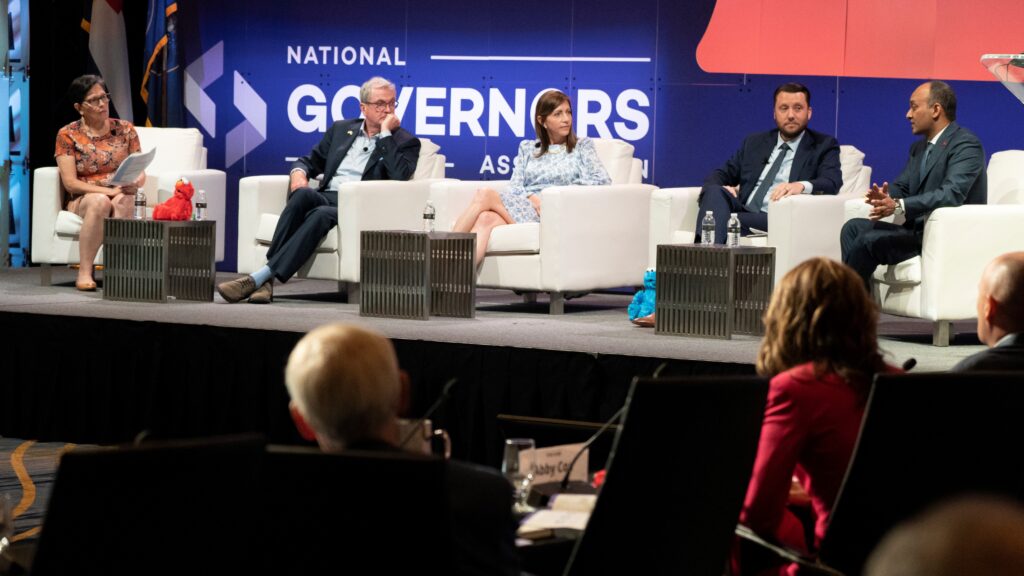New Jersey Governor Phil Murphy opened the first plenary session of the 2023 NGA Annual Meeting with an overview of his 2022-2023 Chair’s Initiative: Strengthening Youth Mental Health, noting the plenary session would serve as the culmination of his yearlong NGA Chair’s Initiative that he first introduced in July 2022 to help harness the bipartisan efforts and national focus on youth mental health to develop policy solutions to respond to the rising rates of mental health distress among the country’s young people.

At the start of the plenary session, Governor Murphy unveiled “Strengthening Youth Mental Health: A Governor’s Playbook.” The playbook resulted from four convenings Governor Murphy held across the country during the past year to meet with close to 500 stakeholders and experts, including individuals with lived experience, to discuss the current state of youth mental health systems, best practices, and implementable, impactful solutions for all states. The written playbook aims to help Governors understand the best practices for youth mental health systems through examples of replicable and impactful solutions that are already underway across the country, with context for Governors to adapt and implement them in their states. NGA’s website provides written summaries of the four convenings Governor Murphy held in Utah, California, Michigan and Pennsylvania, to help shape the playbook released at the NGA Annual Meeting. Governors also held a session focused on youth mental health during the 2023 NGA Winter Meeting; at this meeting, Governors spoke with several mental health experts, including U.S. Surgeon General Vivek Murthy.
“We know this playbook is needed,” Governor Murphy said as he introduced the new resource. “Last month, the CDC released new data showing suicide rates among the 10 to 24 age group reached a 20 year high during the year 2021 [ … ] The painful truth is that we have all heard the stories, and we all know too many examples from our own lives and our own communities, but rather than losing hope, it is these stories that harden our resolve to address the mental health crisis facing our country’s youth.”
In the opening session of the NGA Annual Meeting, New Jersey First Lady Tammy Murphy also released the “Tackling the Maternal and Infant Health Crisis: A Governor’s Playbook” – a complementary policy roadmap to Governor Murphy’s youth mental health playbook. Mrs. Murphy’s playbook comes as part of the parallel initiative she ran in conjunction with Governor Murphy’s Chair’s Initiative to focus on improving maternal and infant health as an extension of her Nurture NJ initiative, a program she launched in 2019 to help reduce the maternal and infant mortality rates in New Jersey.

Mrs. Murphy spoke to attendees about ways the second playbook can help address maternal and infant health, noting, “As the wealthiest country in the world, I think we should all rightfully assume that every mother and baby has the same chance to be born into joy and health, and sadly that’s not the case. For those who do not know, the United States is 55th in the world for maternal mortality rates. We lag behind every other developed country, and that differential is only growing. [ … but ] over 84% of those deaths can be prevented [ … and] there is genuine concern. People love mothers and babies, and people want to lean in and make this right.”
To help detail the findings of the two playbooks, Governor Murphy led a panel discussion during the plenary session to discuss the playbooks and the connections between youth mental health and maternal and infant health. Dr. Jeanette Betancourt, the senior vice president for U.S. social impact at Sesame Workshop, the nonprofit organization behind Sesame Street, moderated the discussion held with Governor and Mrs. Murphy and panelists Dr. Sree Chaguturu, Chief Medical Officer with CVS, and Sean Robbins, executive vice president, Blue Cross Blue Shield Association.
Dr. Sree Chaguturu shared some examples of ways the private sectors can provide mental health resources for Americans, detailing examples such as “Care Management Services for at-risk children [where] we use analytics to identify who has a chance of suicidality, and then [we] intensify our Care Management Outreach for those individuals.” He also spoke about Minute Clinics offering 24/7 mental health services so Americans can meet virtually with counselors or, in select states, in person, fitting with an initiative to work on “stigma, tools and tactics” to help address mental health needs.
Sean Robbins told attendees mental health is a bipartisan issue and offered his belief that we need to consider the time we’re living in to shape a framework for action, noting “for the first part of the 20th century our health care system was designed around making people come to it. The 21st century has to be entirely about making the health care system go to people and meet them where they are, and where kids are and where you are is really different today than where it was when the health care system was built over the last century.” Following the meeting, Mr. Robbins published “Cookie Monster, Governors and Youth Mental Health” to provide more reflections about participating in the plenary session.

Hawai‘i Governor Josh Green, M.D. commended Governor and Mrs. Murphy, sharing “these are the issues that are also plaguing our state, so I’m sure that that’s the case for so many of us. There is a mental health care crisis, especially because of isolation, and we do of course continue to see really tragic numbers on maternal fetal mortality. I would just add for those who are going to decide in their states where to take this challenge up, also add on top of these excellent points that zip code is as impactful as genetic code [ … and] the zip codes where people have the greatest health disparities and poverty numbers are probably where you’re going to get the biggest bang for your intellectual buck.”
Newly elected NGA Chair Utah Governor Spencer Cox thanked Governor and Mrs. Murphy for taking on such timely issues. Governor Cox said he’s already begun sharing the playbook with people in Utah, and he discussed “part of the problem when it comes to mental health generally is just a lack of workforce in this space. The need is there, but we just don’t have the workforce. We just did a comprehensive review of licensure in Utah around mental health work [ … and] if there are other Governors that have been through this journey, I would love to hear from you. I’d love to share with you what we’re doing and the report we just issued.”
In closing, newly elected NGA Vice Chair Colorado Governor Jared Polis asked the panelists to explore “when we look at the mental health space, how do we have that accountability for results [ … ] the standards of care aren’t as tight as they generally are on the physical side; there’s sort of more variety. How do we kind of reward what works, punish what doesn’t work, eliminate moral hazards, and you know actually focus on better patient outcomes?”
The plenary session can be viewed on YouTube and below.













